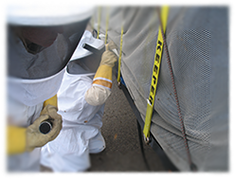Entering CA: Border Protection Stations (BPS)

Station Information Quick Links:
Honeybee shipments entering California are subject to two inspections: A cursory inspection at the border station and a more detailed inspection at destination. These inspections are necessary because hitchhiking insect and weed pests are often found associated with bee colonies.
At California Border Stations, Inspectors will check the exterior colonies and pallets; often this inspection requires the lifting of bee nets. While inspectors may assist with lifting and reattaching nets, it is ultimately the driver's responsibility to make the shipment ready for inspection.
If a suspect pest is found, it must be submitted to CDFA's Plant Pest Diagnostics Laboratory for identification. Identifications are generally made electronically through photographs taken at the border station. Pest specimens are usually identified quickly when the shipment arrives during normal business hours (8 a.m. to 5 p.m. Monday through Friday). Shipments arriving outside these hours may be delayed if pests are found until a scientist is available to make the identification.
If the pest is identified as being of concern, the risk of spreading the pest must be eliminated before the shipment can enter California. Depending on the nature of the pest, cleaning (typically by pressure washing) may be offered as an option for eliminating pest risk. This is the case with most ant and weed pests commonly found. If cleaning is deemed to be a viable option, it is the driver’s responsibility to arrange and pay for any cleaning activities performed through private entities. Border stations do not have staff or equipment on hand to perform cleaning operations.
If no pests of concern are found, the shipment is placed under a Quarantine Hold Notice and allowed to proceed to destination where it is subject to inspection by the County Agricultural Department. Drivers must give an exact physical location or address where the colonies will be placed ((Township and range or GPS coordinates may be substituted for a physical address), the number of colonies, and the state of most recent origin (Township and range or GPS coordinates may be substituted for a physical address). This information is required so the appropriate county can be notified of the impending arrival of the shipment.
Voluntary Ant-Free Certification Program
Red imported fire ants and other actionable ant pests are often found associated with bee colonies. In cooperation with several states, CDFA participates in a voluntary Ant-Free Certification Program to facilitate the entry of ant-free shipments into the State.
Under the voluntary Ant-Free Certification Program, agricultural officials in other states will inspect bee shipments destined to California for pests, specifically ants, and excessive debris which may harbor ants.
Shipments found free of ants will be issued an Ant-Free Certificate by officials in participating states.
The Ant-Free Certificate can then be presented at the Calfornia Border Protection Station to facilitate the inspection and entry of ant-free shipments.
Having shipments pre-inspected for ants by agricultural officials in other states can enable a faster inspection and clearance process at the California Border Protection Station.
Although this certification is not required to enter California, beekeepers are urged to have their colonies inspected and certified to expedite entry.
For shipments accompanied by the Ant-Free Certificate:
- If no actionable ants are found, the shipment will be allowed to enter under quarantine and off-loaded at the final destination prior to inspection by the County Agricultural Commissioner (CAC).
- If five or fewer worker actionable ants are found, the shipment will be allowed to enter under quarantine but will not be allowed to be off-loaded without prior authorization from the CAC.
- If more than five worker actionable ants, or any other life stage (queen, eggs, etc), are found, the shipment will be rejected.
For shipments NOT accompanied by the Ant-Free Certificate:
- If any number or life stage of actionable ants are found, shipment will be rejected.
Rejected shipments must be cleaned and/or reconditioned and re-inspected prior to entry into the State.


